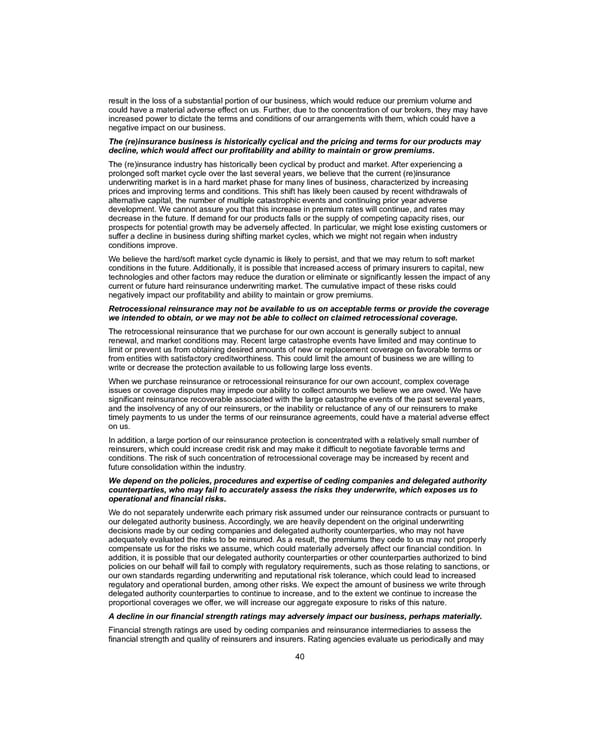result in the loss of a substantial portion of our business, which would reduce our premium volume and could have a material adverse effect on us. Further, due to the concentration of our brokers, they may have increased power to dictate the terms and conditions of our arrangements with them, which could have a negative impact on our business. The (re)insurance business is historically cyclical and the pricing and terms for our products may decline, which would affect our profitability and ability to maintain or grow premiums. The (re)insurance industry has historically been cyclical by product and market. After experiencing a prolonged soft market cycle over the last several years, we believe that the current (re)insurance underwriting market is in a hard market phase for many lines of business, characterized by increasing prices and improving terms and conditions. This shift has likely been caused by recent withdrawals of alternative capital, the number of multiple catastrophic events and continuing prior year adverse development. We cannot assure you that this increase in premium rates will continue, and rates may decrease in the future. If demand for our products falls or the supply of competing capacity rises, our prospects for potential growth may be adversely affected. In particular, we might lose existing customers or suffer a decline in business during shifting market cycles, which we might not regain when industry conditions improve. We believe the hard/soft market cycle dynamic is likely to persist, and that we may return to soft market conditions in the future. Additionally, it is possible that increased access of primary insurers to capital, new technologies and other factors may reduce the duration or eliminate or significantly lessen the impact of any current or future hard reinsurance underwriting market. The cumulative impact of these risks could negatively impact our profitability and ability to maintain or grow premiums. Retrocessional reinsurance may not be available to us on acceptable terms or provide the coverage we intended to obtain, or we may not be able to collect on claimed retrocessional coverage. The retrocessional reinsurance that we purchase for our own account is generally subject to annual renewal, and market conditions may. Recent large catastrophe events have limited and may continue to limit or prevent us from obtaining desired amounts of new or replacement coverage on favorable terms or from entities with satisfactory creditworthiness. This could limit the amount of business we are willing to write or decrease the protection available to us following large loss events. When we purchase reinsurance or retrocessional reinsurance for our own account, complex coverage issues or coverage disputes may impede our ability to collect amounts we believe we are owed. We have significant reinsurance recoverable associated with the large catastrophe events of the past several years, and the insolvency of any of our reinsurers, or the inability or reluctance of any of our reinsurers to make timely payments to us under the terms of our reinsurance agreements, could have a material adverse effect on us. In addition, a large portion of our reinsurance protection is concentrated with a relatively small number of reinsurers, which could increase credit risk and may make it difficult to negotiate favorable terms and conditions. The risk of such concentration of retrocessional coverage may be increased by recent and future consolidation within the industry. We depend on the policies, procedures and expertise of ceding companies and delegated authority counterparties, who may fail to accurately assess the risks they underwrite, which exposes us to operational and financial risks. We do not separately underwrite each primary risk assumed under our reinsurance contracts or pursuant to our delegated authority business. Accordingly, we are heavily dependent on the original underwriting decisions made by our ceding companies and delegated authority counterparties, who may not have adequately evaluated the risks to be reinsured. As a result, the premiums they cede to us may not properly compensate us for the risks we assume, which could materially adversely affect our financial condition. In addition, it is possible that our delegated authority counterparties or other counterparties authorized to bind policies on our behalf will fail to comply with regulatory requirements, such as those relating to sanctions, or our own standards regarding underwriting and reputational risk tolerance, which could lead to increased regulatory and operational burden, among other risks. We expect the amount of business we write through delegated authority counterparties to continue to increase, and to the extent we continue to increase the proportional coverages we offer, we will increase our aggregate exposure to risks of this nature. A decline in our financial strength ratings may adversely impact our business, perhaps materially. Financial strength ratings are used by ceding companies and reinsurance intermediaries to assess the financial strength and quality of reinsurers and insurers. Rating agencies evaluate us periodically and may 40
 2021 Annual Report Page 55 Page 57
2021 Annual Report Page 55 Page 57